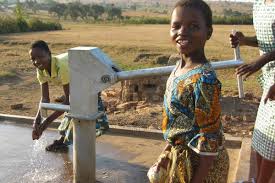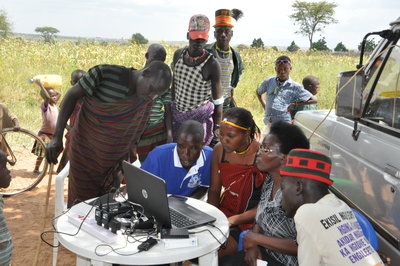Study Underscores Need for Behavior Change around Water Use and Sanitation
New formative research on trachoma by JHU∙CCP highlights water use behaviors, in addition to lack of access to clean water and sanitation resources, as a significant driver of the disease. The research, conducted in two regions of Uganda in July and August 2013, was released on World Water Day. It was conducted as part of the Social and Behavior Change Communication for Trachoma Project, an Innovations Grant that is being led by Sightsavers and funded by the Department for International Development in the United Kingdom.
“This research is pioneering because it examines the socio-behavioral components of trachoma prevention,” explains ‘Kuor Kumoji, Senior Technical Advisor at JHU∙CCP. “While many studies have examined medical and surgical treatment options for Trachoma, there has been less emphasis on understanding the cultural and contextual issues underlying behaviors related to facial cleanliness and environmental change, which are aspects of the WHO’s SAFE Trachoma prevention strategy. Our research shows that improving access to clean water alone might not prevent Trachoma; we need to include strategies to change behaviors around use of that water as well as the acceptance and use of latrines if we are to significantly stem transmission of the disease. We also need to empower community members to understand that they have the ability to prevent Trachoma if they adopt appropriate hygiene and sanitation behaviors.”
Trachoma is a neglected tropical disease that affects about eighty million people worldwide and can lead to blindness if untreated. It is prevalent in communities that have inadequate water supply, poor infrastructure for sanitation, poor personal hygiene behaviors and limited health services. The World Health Organization aims to eliminate Trachoma by 2020.
JHU∙CCP researchers conducted this study in selected communities in the Karamoja and Busoga Regions of Uganda. Their goals were to identify and understand the contextual and behavioral factors that influence the transmission and prevention of Trachoma infection.
While dung, dirt and dust, as well as lack of access to clean water resources, were identified by some respondents as contributors to Trachoma, personal hygiene, specifically clean hands and faces were not considered to be a concern for many in the communities, nor were they linked to disease transmission. In cases where respondents recognized the importance of face washing, their ability to follow through correctly on this behavior was negatively impacted by the scarcity of clean water, long distance to water sources and poor technique. Researchers found that water was frequently rationed in the household, and using water for cleanliness became a very low priority.
Results of this study, which will be released soon, will inform the development of a behavior change communication campaign for preventing Trachoma. JHU∙CCP believes that Trachoma will only be eliminated if water use behavior is changed in tandem with efforts to improve structural water, sanitation and hygiene resources.



